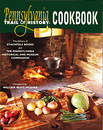Disappearing Foods
This article originally appeared in Pennsylvania Trail of History Cookbook
As Pennsylvania has grown and prospered over the centuries, many foods have disappeared from the commonwealth's tables. Squirrel, groundhog, pigeon, and rabbit - just another meal on the Pennsylvania frontier - are rarely served today. And few menus feature dandelion greens; pemmican, dried meat mixed with animal fat and berries: samp, a corn porridge; or skillygallee, fried pork and crumbled hardtack. Homemade root beer * is a rare treat.
Pioneer cooks found innovative solutions when certain ingredients were not available or their importation was too expensive. For example, early immigrants enjoyed pickled foods but did not have the necessary ingredients, such as vinegar, to make them. Then they discovered pickleweed, or picklewort, growing along the brackish marsh areas of the Delaware River. This succulent, salt-loving plant tastes like pickles and is an excellent source of iodine. Though most people today are not familiar with pickleweed, it was well known to many Colonial cooks.
At Lancaster County's Landis Valley Museum, the largest museum in the United States of early Pennsylvania Dutch life, including foodways, the nationally recognized Heirloom Seed Project is working to keep plants with historical significance from extinction. Volunteers assist experts in researching, testing, and preserving more than 200 varieties of herbs, vegetables, and ornamental plants used by the Pennsylvania Dutch between 1750 and 1940, such as Deacon Dan beets, Seneca corn, Riesentraube tomatoes, and flax. Because these plants have not been hybridized, gardeners can save seeds from heirloom varieties with the assurance that each new generation of plants will bear fruit that is similar to the fruit from past seasons. The Heirloom Seed Project also offers seeds, techniques, and growing information to the public. Heirloom varieties of plants are for sale during the Herb and Garden Faire in mid-May.
* Recipes for these dishes are available in the Pennsylvania Trail of History Cookbook
Visit
Landis Valley Village and Farm Museum, Lancaster, PA
Step into the largest museum of early Pennsylvania German life in the country.
For Further Reading
 |
Pennsylvania Trail of History Cookbook Edited by Kyle R. Weaver, Diane B. Reed, and Fred Lauver Forward by William Woys Weaver Stackpole Books and Pennsylvania Historical and Museum Commission 2004 |
 |
Landis Valley Museum: Pennsylvania Trail of History Guide by Elizabeth Johnson Stackpole Books and Pennsylvania Historical and Museum Commission 2002 |

